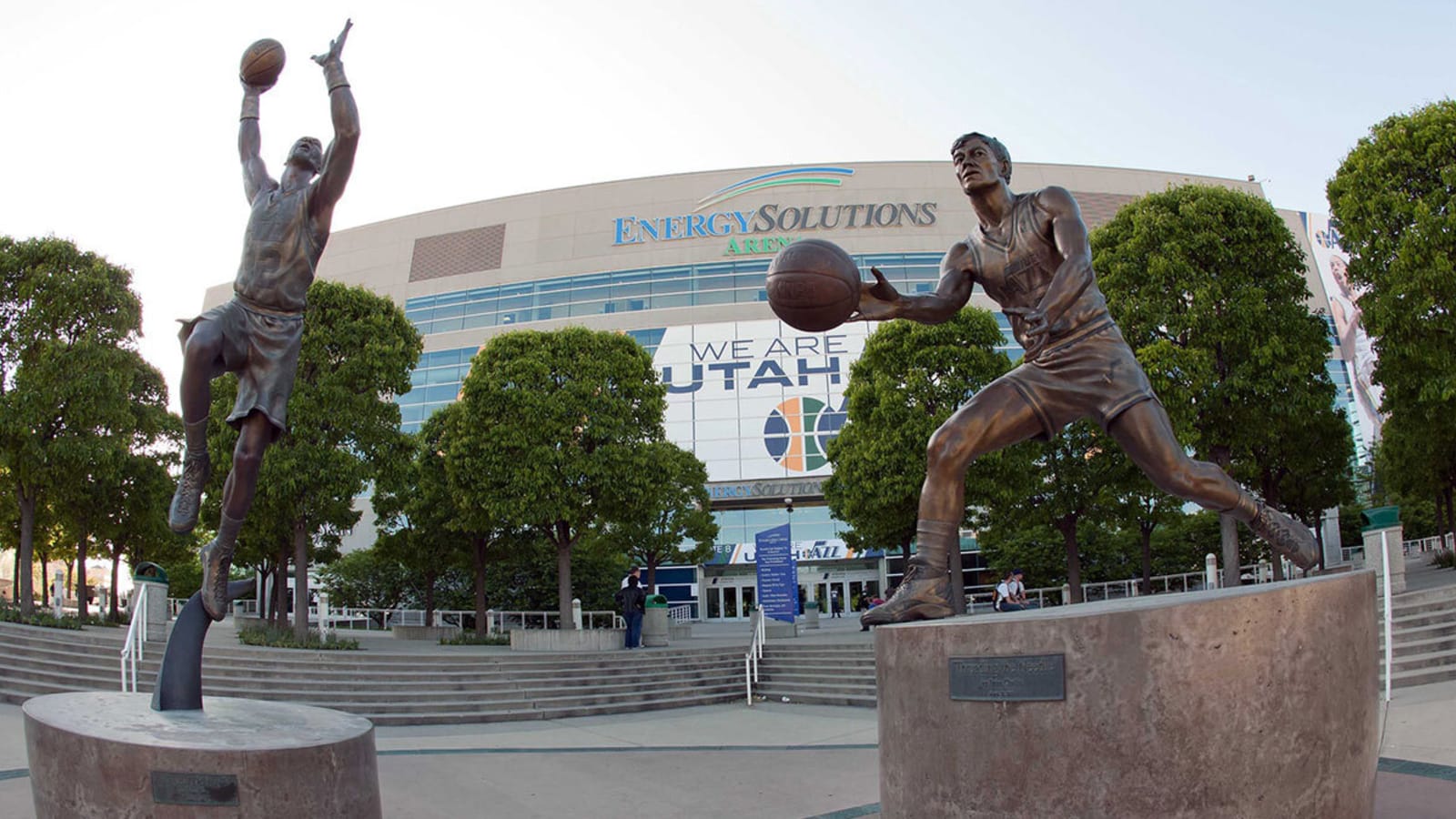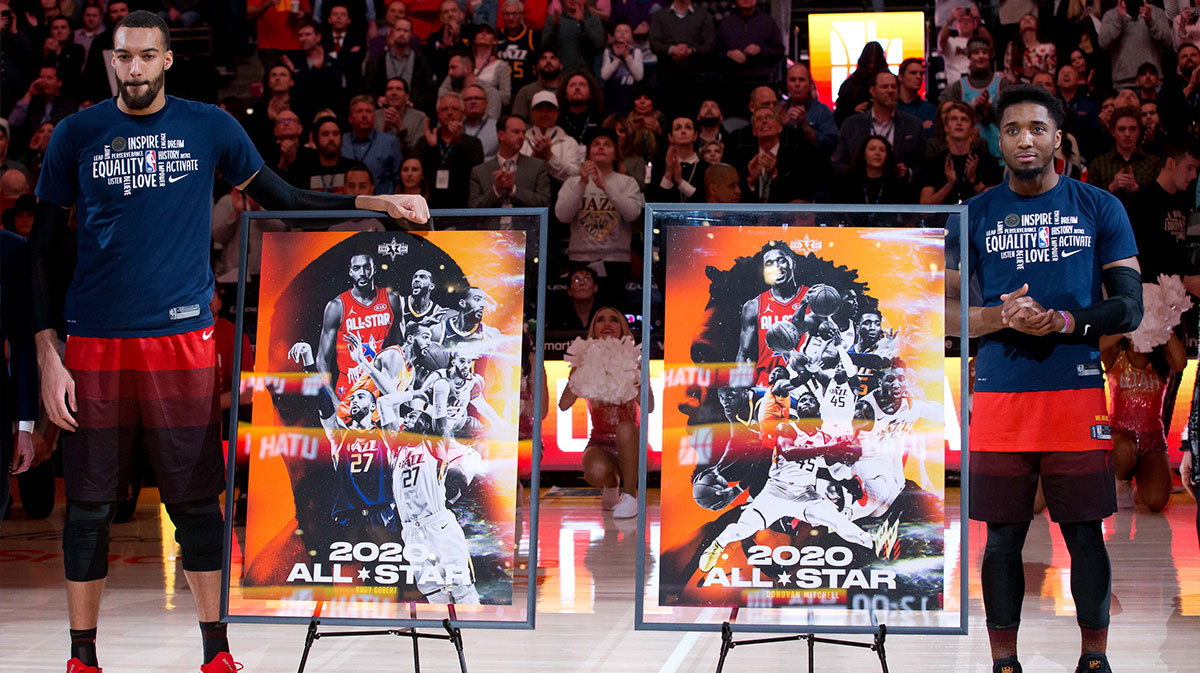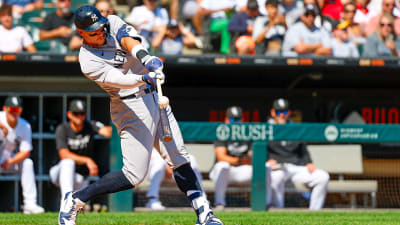
Many great players have suited up for the Utah Jazz in the franchise’s 50 seasons, but ranking players across eras is always difficult.
Before we see who joins John Stockton and Karl Malone on the Top 10 list of the greatest Utah Jazz, here are the criteria that were considered when making the rankings: peak performance, longevity, career statistical rankings, and overall importance to the franchise. All stats are via basketball-reference.
On to the list.
10. Gordon Hayward, SF
Gordon Hayward played seven seasons for the Jazz, but he never won a playoff series in his time with Utah. Still, it’s hard to ignore just how productive Hayward was once he hit his stride, culminating in an All-Star appearance in his last season with the Jazz.
Hayward was one of the most complete players in Jazz history. He could score at all three levels, rebound, defend, and make plays for others. Although his exit to Boston in free agency left a sour taste in everyone’s mouth, Hayward’s level of talent and production in his last few years was some of the best from anyone other than John Stockton or Karl Malone.
Franchise Ranks: 4th in 3-pointers made, 9th in assists, 10th in steals, 9th in points
9. Deron Williams, PG
After the Jazz selected Deron Williams with the third pick of the 2005 NBA Draft, he didn’t waste any time establishing himself as one of the most talented point guards in the league.
Since the Jazz drafted him a spot ahead of Chris Paul, it created a natural rivalry. And Williams almost always performed better than Paul in their matchups. Williams’ rise to stardom was fast and furious, as he averaged over 16 points and 9 assists a game in just the second year of his career.
Unfortunately for the Jazz, the honeymoon period didn’t last long. Although Williams was incredibly productive, he clashed with head coach Jerry Sloan and only played 5½ seasons in Utah before the Jazz t to the New Jersey Nets.
Williams looked every bit the heir apparent to John Stockton, filling the shoes of a legend and paving his own path as an NBA All-Star. His run with Utah and his career in general just didn’t last nearly as long as it probably should have.
Franchise Ranks: 10th in 3-pointers made, 4th in assists
8. Donovan Mitchell, SG
This ranking might be a little low for Mitchell, as he was incredibly productive right from the jump as a rookie and put together five brilliant seasons with the Jazz, averaging nearly 24 points a game.
Mitchell’s offensive production regularly paced one of the league’s best teams as the Jazz averaged close to 49 wins a season in a loaded Western Conference during Mitchell’s five years. His brief run was cut short by the team’s massive failures in the postseason, as the Jazz failed to get out of the first round in three of his last four seasons in Utah.
While it’s hard to hold Mitchell responsible for those playoff failures (more on that in a minute), the lack of postseason success eventually drove the team toward a full rebuild.
Regardless, Mitchell is clearly one of the most talented and productive scorers in franchise history, and his ascent to superstardom elevated the Jazz to a must-watch team.
Franchise Ranks: 2nd in 3-pointers made, 8th in points
7. Jeff Hornacek, SG
Franchise Ranks: 7th in assists, 7th in steals, 1st in 3-point percentage, 1st in free throw percentage
It’s wild to remember that Hornacek didn’t join the Jazz until he was in his thirties and yet still managed to make such an undeniable impact in the back half of his career.
Hornacek instantly became the perfect third wheel next to John Stockton and Karl Malone, providing great on-ball defense and the kind of shooting and floor spacing the Stockton-Malone pick-and-roll needed to truly thrive.
Hornacek’s counting stats with the Jazz don’t fly off the page (14.4 PPG, 4 APG), but his efficiency as a shooter and his secondary playmaking were critical for Jerry Sloan’s teams. He was the clear third-best player on some historically dominant Jazz teams that came up just short against (arguably) the greatest player of all time in Michael Jordan.
For over six seasons, Hornacek was a reliable two-way player who took on tough defensive assignments and filled any gaps John Stockton and Karl Malone left behind. He’s one of the most beloved players in franchise history, and his overall importance to the best teams in Jazz history can’t be overstated.
6. Andrei Kirilenko, SF
Ahead of his time and one of the most underrated players in NBA history, Andrei Kirilenko was a force to be reckoned with defensively. Kirilenko was a three-time All-Defensive team player and led the NBA in blocks during the 2004-05 season, which is unheard of for a small forward.
Despite never being much of a volume scorer, AK47 was a perfect fit in Jerry Sloan’s flex offense, cutting hard for layups and getting to the rim at incredible rates. Kirilenko’s athleticism in transition and ability to guard all five positions defensively was rarely seen in the early 2000s, and it’s fascinating to think about what he’d look like today in a more wide-open setting.
This ranking may feel high, but Kirilenko’s longevity and defensive dominance make him worthy of a high-ranking spot in Jazz history.
Franchise Ranks: 9th in rebounds, 6th in assists, 4th in steals, 2nd in blocks, 6th in points
5. Rudy Gobert, C

Speaking of defensive dominance…it’s three-time Defensive Player of the Year and six-time All-Defensive team member Rudy Gobert. Since the Jazz traded him to the Minnesota Timberwolves, he added a fourth DPOY.
Gobert’s place amongst other Jazz greats is always going to be a point of contention, even though Gobert’s ability to anchor an entire defense and deter opponents from even attempting shots at the rim was truly game-changing. Very few players in franchise history have directly impacted winning the way Gobert did.
The tricky part about Gobert’s nine seasons with the Jazz is the four first-round playoff exits the team suffered through and the blame cast on Gobert for not being able to guard in space and punish defenses for putting much smaller defenders on him at the other end.
Gobert’s lack of development offensively ultimately capped the ceiling for the Jazz, leading to the eventual rebuild and trade to the Timberwolves. Still, Gobert was an elite defender and one of the best centers in the league for nearly a decade.
Franchise Ranks: 2nd in rebounds, 3rd in blocks, 10th in points, 1st in field-goal percentage
4. Pete Maravich, G
Pete Maravich is the greatest scorer in college basketball history, averaging 44.2 points per game at LSU. While his pro career could never live up to that level of greatness, some of Pistol Pete’s best seasons came in a Jazz uniform when the team was located in New Orleans.
Maravich was a three-time All-Star and three-time All-NBA player with the Jazz, winning the league’s scoring title in the 1976-77 season by averaging 31.1 points per game. Maravich, who played nearly his whole career without the 3-point line, regularly bombed from beyond 25 feet and was one of the league’s premier distance shooters.
Maravich’s offensive brilliance never amounted to postseason success for the Jazz, and durability became an issue towards the end of his career, but Pistol Pete is unquestionably one of the greatest scorers and flashiest passers the league ever saw. If there was a Mount Rushmore of the greatest Jazz players, you can’t keep Pistol Pete off it.
Franchise Ranks: 8th in assists, 7th in points, 1st in triple-doubles
3. Adrian Dantley, SF
If you had to pick the best player in NBA history that no one ever really seems to talk about, Adrian Dantley would be at the top of the list. The Hall of Fame forward was a walking bucket, leading the league in scoring twice as a member of the Jazz.
Dantley’s averages across seven seasons with the Jazz almost seem made up: 29.6 PPG, 6.2 RPG, 3.7 APG on 56.2 percent field-goal percentage.
Volume scorers who are 6-foot-5 are never even close to that efficient, but Dantley was. The Jazz struggled to surround Dantley with enough talent to make any real noise in the postseason during the early 80s, but the 6-time All-Star put together a stretch with Utah that was truly for the record books. There will never be another scorer like Adrian Dantley.
Franchise Ranks: 10th in assists, 3rd in points, 2nd in field goal percentage
2. Karl Malone, PF
It’s no surprise to see Karl Malone and John Stockton together at the top of the greatest Jazz players rankings, but the order can be haggled about.
Karl Malone was the driving force behind Utah’s offense for an incredible 18 seasons, averaging 25 points and 10 rebounds a game with unreal durability. Malone was a 14-time All-Star, a two-time league MVP, and is right there with Tim Duncan for the honor of being the greatest power forward to ever play the game.
So why isn’t he in the top spot of this ranking?
While Karl Malone certainly wouldn’t look out of place in the first spot, especially since he won his league MVP awards while playing with John Stockton, the records he set feel slightly more attainable than Stockton’s.
Malone scored the third-most points in NBA history with 36,928 and is seventh on the all-time rebound list with 14,968. Those are astronomical numbers, and the type of durability required to hit those numbers is rarely ever seen. But Stockton’s career totals, as we’ll detail here shortly, are almost laughably unachievable.
Franchise Ranks: 1st in rebounds, 1st in points, 2nd in assists, 2nd in steals, 5th in blocks, 7th in field-goal percentage
1. John Stockton, PG
You can’t have a discussion about the greatest point guards to ever play without John Stockton. His brilliance over nearly two full decades is the stuff of legends. Stockton led the league in assists nine straight seasons and made an All-NBA team 11 times, but it’s his career totals that no one will ever touch.
Stockton finished his career as the NBA’s all-time leader in assists with 15,806. Let’s provide some perspective on how untouchable that record is.
Chris Paul, who ranks third all-time in assists and has played 18 seasons in the NBA as one of the league’s best point guards, is 4,305 assists short of Stockton’s record.
Even if Paul could play all 82 games for the next five seasons and average 10 assists a game…he still wouldn’t pass Stockton.
Russell Westbrook, currently ninth on the all-time assist leaderboard, and 15 years into his career, could do the same as Paul for eight more seasons…and still not pass Stockton.
Don’t forget Stockton’s steals record, either. LeBron James is ninth all-time in steals with 2,186 over his 20-year career. James could play full 82-game seasons for the next eight years, turning 45 years old in the process, while putting up his career average of 1.5 steals per game…and still not break Stockton’s record of 3,265 total steals.
Stockton’s assists and steals record could very well outlive us all, so we’ll give the nod to Stockton on the greatest Jazz players list.
Franchise Ranks: 1st in assists, 1st in steals, 2nd in points, 3rd in 3-pointers made, 5th in rebounds
More must-reads:
- Malik Beasley under NBA investigation for gambling allegations
- Bulls score massive win with Josh Giddey extension
- The 'Multiple TD passes in an NFL debut' quiz
Breaking News
Trending News
Customize Your Newsletter
 +
+
Get the latest news and rumors, customized to your favorite sports and teams. Emailed daily. Always free!








